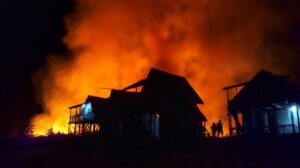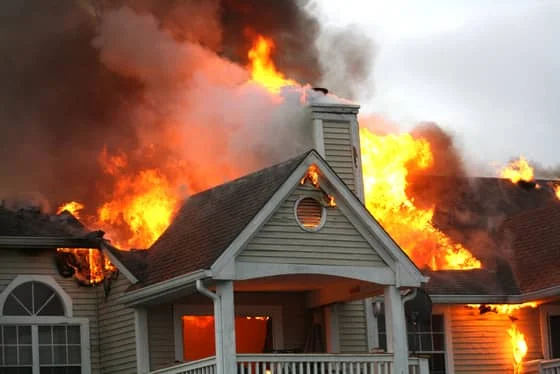A house fire is always tragic. No matter how big or tiny the fire, it is going to ruin to some degree the priceless memories that were created in the home, including considerations such as how hot are house fires. As you sift through the aftermath, you may face the daunting task of deciding whether to rebuild or sell a fire-damaged house. Either way, making the decision can magnify such loss, as it forces you to confront the reality of the damage and the persistent smoke odor.
Still, you can’t afford to lament your loss for very long. You need to start cleaning up for the safety and well-being of yourself and your family.

One of the hardest things to clean up and get rid of after a fire is the smell of smoke. In general, depending on your cleanup efforts, you can expect the smell of smoke to last in the home for anywhere from two weeks to a month.
Of course, without good cleanup efforts the smell could last much, much longer.
So let’s take a closer look at what you can do to remove the smell of smoke from a house as fast as possible.
First, why is smoke damage so difficult to rid of?
One reason is because a variety of items, like draperies, furniture, and area rugs, can absorb smoke particles.
Because the molecules are so tiny, they can be absorbed by a wide range of surfaces. That’s why you should consider each item of furniture in your home as a potential victim of smoke damage.
How to go about cleaning up smoke damage
First and foremost, be safe. That means you should take the appropriate safety precautions before entering your home. Never enter your property without a mask and some eye protection. Ensure that your equipment is built to withstand fire damage. If at all possible, dress with long sleeves to stop smoke from getting on your skin.
Examine the damage carefully
You must approach your examination with no preconceived notions and endeavor to maintain your composure. Make sure you’re in the appropriate frame of mind before trying to remove smoke odor because it will aid in the healing process. Asking yourself questions like the following is also important as the answers can help direct your cleanup efforts. Ask yourself:
– How much time did the fire last?
– How much of the house was destroyed by the fire?
– Do you have latex paint on your walls?
– What types of materials – such as wood, plastic, and upholstery – were burned?
Next, explore the house and assess the smoke damage. Bring paper and a pen so you may record what you see. Keep track of which rooms suffered more. Be sure to look for soot or ash in your HVAC system, furnace filters, window screens, and in any air filters.
What can I do to clean the smell of smoke from the house?
Once you complete your inspection, it is time to begin the cleaning process. First, you should make sure you have the appropriate cleaning supplies.
For example, candles with scents like vanilla or rose may seem like a quick remedy, but they won’t make the smoke smell go away.
To get rid of smoke, you’ll need warm water, dish soap, baking soda, and white vinegar, among other things. To dispose of damaged items, you should also have rags, vacuum cleaners, and garbage bags.
Here are the steps you should take to clean the home of smoke damage:
Step 1: Get rid of the clutter
Whether you are rebuilding your property or considering selling a fire-damaged house, you must remove as many household items as you can before starting the cleanup process. Anything that smells like smoke from a fire should be taken outside. Sort your possessions into salvageable and destroyed categories. If cleaning up the smoke smell from an item would be a pain, be honest with yourself and place it in the destroyed pile.
Carpets, wall coverings, construction supplies, and insulation are examples of items that cannot be reclaimed. To get rid of the smoke smell, furniture, clothing, and linens should be removed as quickly as possible and washed elsewhere.
Another way to help eliminate the smoke odor is to leave items outside in the open air.
Step 2: Open the windows and ventilate
You should open all of your windows and doors in step two. More smoke particles will be expelled from your house with the more fresh air that you let in.
So open your windows and doors as widely as you can. Make sure the weather is not too hot or too cold because unfavorable conditions might accentuate the scent of smoke.
Also, when you begin cleaning, use fans to keep fresh air circulating through your house.
In this step, you should also put an exhaust fan at your front door of the house to create a make-shift ventilation system. This will allow you to bring as much external air into the home as possible.
Step three: Start cleaning
The first thing you should do is sprinkle baking soda on the surfaces that you plan to clean. The powder aids in removing any residue and smoke odors.
After that, gently scrub the surfaces with warm water and white vinegar. The stain and smell should go after a few minutes. As an alternative, you might use dish soap to get rid of stains.
Clean everything as thoroughly as possible.
Remember, the smell of smoke is dangerous!
Carbon monoxide, carbon dioxide, and particulates are present in every whiff of smoke. Aldehydes, acid gases, sulfur dioxide, nitrogen oxides, polycyclic aromatic hydrocarbons (PAHs), benzene, toluene, styrene, metals, and dioxins are just a few of the numerous substances that smoke may include.
Depending on what has burned, how much oxygen is available, and the burn temperature, smoke can contain a variety of particles and compounds, both in type and quantity.
Avoiding prolonged exposure to smoke is highly advisable. Smoke exposure may have a more negative impact on one’s health in older people, fetuses, newborns, young children, and people with cardiovascular or respiratory disorders (such as asthma).
Smoke inhalation for a brief period of time might have immediate (acute) effects. Smoke’s odor can make you queasy and is irritating to the eyes, nose, and throat. According to studies, some persons who are exposed to heavy smoke experience transitory alterations in lung function that make breathing more challenging.
Want to avoid a long cleanup process?
Sell your house fire-damaged house to We Buy Fire Damaged Houses. We pay all cash and buy houses in “as-is” condition so you don’t have to make any repairs.
Fill out the form below to learn more.
Photo by Thomas Ehling on Unsplash

